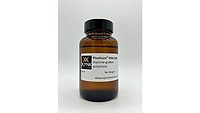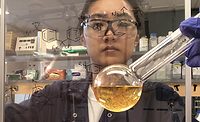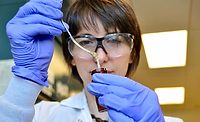XLYNX Materials Introduces a New PFAS-Free Molecular Adhesive

Dr. Rashid Nazir speaks to the development of BondLynx BXW-202. Photo courtesy of Xlynx.
XLYNX Materials has redesigned its flagship molecular adhesive, BondLynx. The new crosslinker and surface treatment solution, known as BondLynx BXW-202, has been rebuilt to eliminate fluorine from its chemical structure. The result is an adhesive that is safer for the environment, more stable for storage, and more cost-effective for customers.
Unlike traditional adhesives that rely on mechanical forces to hold materials together, BondLynx uses bis-diazirine technology to create covalent bonds between polymer chains, permanently crosslinking them through strong carbon-carbon bonding. Originally designed to bond “unbondable” low surface energy plastics like polypropylene and polyethylene, BondLynx has also found applications as a surface functionalizing agent, an additive in microelectronics fabrication, a performance textile strengthener, and a molecular stabilizer for perovskites, quantum dots, and organic electronics.
Until now, fluorine, one of the most reactive elements in the periodic table, was considered a critical component of bis-diazine crosslinking. With the move towards eliminating PFAS, the development of a suite of fluorine-free products was a priority.
“With all we now know about the persistence of PFAS chemicals in the environment, it was important for us to get ahead of the problem and be a part of the solution,” stated Director of Strategy, Sean Bourquin. “Our clients have been telling us the same thing. This issue is on everyone’s radar these days, so we knew we had to find a new formula for BondLynx.”
To accomplish this goal, the R&D team at XLYNX Materials went back to the drawing board to create a version of BondLynx that did not depend on fluorine.
“To be honest, we weren’t sure whether a fluorine-free crosslinker with the adhesive strength of the original BondLynx would be possible,” admitted Senior Research Chemist, Dr. Rashid Nazir. “It was uncharted territory, but being innovative is what our team has always done best.”
He did not reveal details about the solution they designed, Dr. Nazir reported that test results for the new molecular adhesive have exceeded expectations. In comparative lap shear adhesion tests with conventional polyurethane, cyanoacrylate, and epoxy adhesives, BondLynx BXW-202 outperformed the competition in every category, including 70% to 124% stronger adhesion for polypropylene; 84% to 316% stronger adhesion for polyvinyl chloride rubber; and 100% to 200+% stronger adhesion for high density polyethylene.
“It’s exciting to see how well it’s performing,” said Bourquin. “To be able to eliminate PFAS chemicals, add stability, and drive down costs, all without compromising the quality of BondLynx adhesion, is a remarkable achievement that we can all be proud of.”
To learn more, visit www.xlynxmaterials.com.
Looking for a reprint of this article?
From high-res PDFs to custom plaques, order your copy today!





